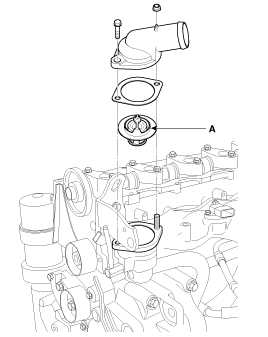Loosen the drain plug(A), and drain the coolant.
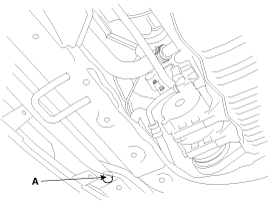
Never remove the radiator cap when the engine is hot.
Serious scalding could be caused by hot fluid under high pressure escaping from the radiator.
When pouring engine coolant, be sure to shut the relay box lid and not to let coolant spill on the electrical parts of the paint. If any coolant spills, rinse it off immediately.
Slide the heater temperature control lever to maximum heat. Make sure the engine and radiator are cool to the touch.
Remove the radiator cap.
Loosen the drain plug(A), and drain the coolant.

Tighten the radiator drain plug(A) securely.
Remove the coolant reservoir tank. Drain the coolant and reinstall the coolant reservoir tank. Fill the coolant reservoir tank to the MAX mark with the coolant.
Fill the coolant into the radiator to the base of filler neck. Gently squeeze the upper/lower hoses of radiator so as to bleed air easily.
Use only genuine antifreeze/coolant.
For best corrosion protection, the coolant concentration must be maintained year-round at 50% minimum. Coolant concentrations less than 50% may not provide sufficient protection against corrosion of freezing.
Coolant concentrations greater then 60% will impair cooling efficiency and are not recommended.
Do not mix different brands of antifreeze/coolants.
Do not use additional rust inhibitors or antirust products; they may not be compatible with the coolant.
Start the engine and allow coolant to circulates.
When the cooling fan operates and coolant circulates, refill coolant through the radiator filler neck.
Repeat 7 until the cooling fan 3~5 times and bleed air sufficiently out of the cooling system.
Install the radiator cap and fill the reservoir tank to the "MAX" line with coolant.
Run the vehicle under idle until the cooling fan operates 2~3 times.
Stop the engine and allow coolant to cool.
Repeat steps 6 to 11 until the coolant level stays constant and all air is bleed out of the cooling system.
Recheck the coolant level in the reservoir tank for 2~3 days after replacing coolant.
Coolant capacity : 8.4 liters(8.88 US qt, 7.39 lmp qt)
Replace the thermostat if it is open at room temperature.
Suspend the thermostat in a container of water.
Do not let the thermometer touch the bottom of the hot comtainer.
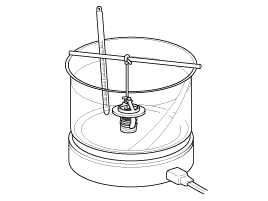
Heat the water and check the temperature with the thermomster. Check the temperature at which the thermostat first opens, and at which it is fully open.
Measure the lift height of the thermostat when it is fully open.
STANDARD THERMOSTAT
Lift height : above 8.0mm (0.31in.)
Starts opening: 85 ± 1.5°C (185 ± 2.7°F)
Fully open : 100°C (212°F)
Drain the engine coolant after removing drain plug(A).

Remove the drive belt and the timing belt.
Remove the timing belt rear cover(A).
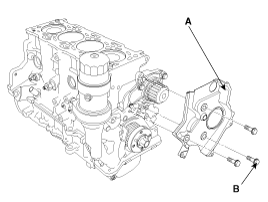
Damage of the water pump or coolant-leakage can be occurred when the longer bolt than the specification(18mm) is used.
Remove the water pump(A) with the gasket(B) by removing four bolts. (One bolt A and three bolt B)
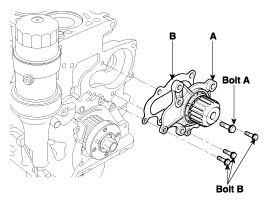
Inspect, repair and clean the mating surface on the engine block.
Install the water pump, with a new gasket in the reverse order of removal.
Tightening torque
For timing belt rear cover
7.8 ~ 11.8N.m (0.8 ~ 1.2kgf.m, 5.8 ~ 8.7lb-ft)
For water pump
Bolt A :
47.1 ~ 51.0N.m (4.8 ~ 5.2kgf.m, 34.7 ~ 37.6lb-ft)
Bolt B :
9.8 ~ 11.8N.m (1.0 ~ 1.2kgf.m, 7.2 ~ 8.7lb-ft)
Clean the spilled engine coolant.
Remove the under cover.
Drain the engine coolant after removing drain plug. Remove the radiator cap to speed draining.
Remove the radiator upper hose(A).
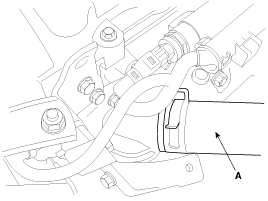
Remove the cooling fan motor connector(A, B).
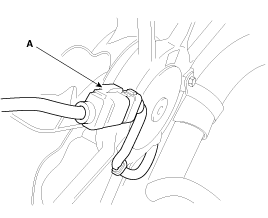
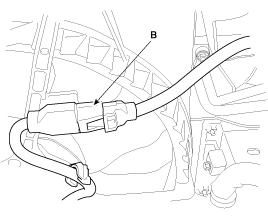
Remove the radiator grill upper cover(A).
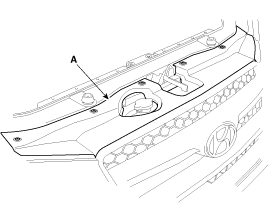
Remove the front bumper after removing the front lamp cleaning nozzle cover.(Refer to 'BD' group)
Remove the radiator cap hose(A).
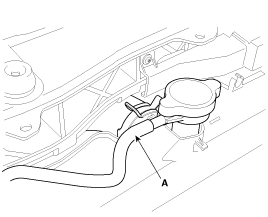
Remove the left side cooling fan assembly first.
Remove the radiator lower hose bracket mounting bolt.
Remove the radiator bracket bolts(A).
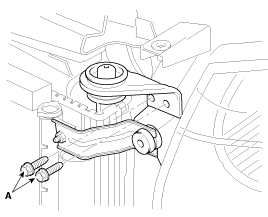
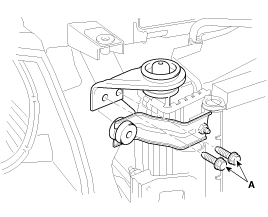
Remove the radiator from engine room.
Drain the engine coolant.
Remove the coolant inlet fitting.
Remove the thermostat(A).
